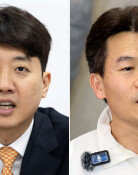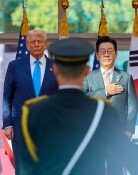Top 30 Biz Groups to Invest $77.6 Bln This Year
Top 30 Biz Groups to Invest $77.6 Bln This Year
Posted January. 16, 2010 07:27,
The countrys top 30 companies will significantly expand investment and employment, news reports said yesterday. They will invest 87.2 trillion won (77.6 billion U.S. dollars), up 16.3 percent from last year, and hire 79,199 workers, up 8.7 percent.
The Federation of Korean Industries announced the plan at a meeting on expanding investment and employment for the 30 conglomerates yesterday. Those attending included President Lee Myung-bak, Federation of Korean Industries Chairman Cho Suk-rai, Samsung Group Acting Chairman Lee Soo-bin, Hyundai-Kia Automotive Group Chairman Chung Mong-koo, SK Group Chairman Chey Tae-won, and LG Group Chairman Koo Bon-moo.
○ Aggressive management via higher investment
Samsung will invest 26.5 trillion won (23.6 billion dollars) and hire 19,000 workers this year. Chairman Lee said, We could further raise (investment and employment) depending on economic conditions.
Samsung Electronics will plunk down 18.4 trillion won (16.4 billion dollars), taking up almost 70 percent of the groups investment. The companys investment slated for this year is the second largest in its history after 27.8 trillion won (24.7 billion dollars) in 2008. Last years investment, however, reportedly declined from the previous year, though the company did not release related data.
Hyundai-Kia will invest 10.5 trillion won (9.34 billion dollars) this year, the largest in its history and up 12 percent from 9.4 trillion won (8.36 billion dollars) last year.
Of the amount, 4.6 trillion won (4.1 billion dollars) will go toward research and development for eco-friendly cars and 5.9 trillion won (5.25 billion dollars) to facility expansion. The automotive group will hire 6,000 staff, including 1,000 interns.
SK will invest seven trillion won (6.2 billion dollars), up 10 percent from last year, but did not release details.
LG will spend 15 trillion won (13.3 billion dollars) and steelmaker POSCO 9.3 trillion (8.3 billion dollars), both record highs for both businesses.
Koreas top conglomerates refrained from capital investment last year due to the global economic crisis. This gave them more leeway to spend this year, according to experts.
Through aggressive investment, they also seek to gain ground in market share, which will undergo change in the wake of the economic crisis.
○ Consensus on the need for job creation
President Lee said at the meeting, Businesses voluntarily stabilize wage levels, adding, (Companies) asked me about government guidelines, but the wages of public officials havent risen over the past two years. That should send a message to private companies.
He implied by this comment that companies should further pursue job sharing, under which employment is raised by reducing work hours and wages, according to experts.
The business leaders attended the meeting agreed on this request and pledged to create 7,000 more jobs this year. In a similar vein, the federation also launched a committee to create three million jobs.
Some say, however, that the governments call for job creation is not easy to follow since the Korean economy has long suffered from jobless growth.
The number of new jobs this year will decline 5.6 percent from last years, according to a survey conducted by the Korea Chamber of Commerce and Industry. The survey questioned 256 among the countrys top 500 companies that have announced recruiting plans.
Thus, the job market will remain tight this year though the decline in hiring is modest from last years (16.5 percent).
A federation executive said, Large corporations cut investment last year but retained workers, so it wont be easy for them to hire new employees.
Cho Dong-geun, an economics professor at Myongji University in Seoul, said, What is needed is nurturing new industries that can create jobs, adding, The government and politicians should create a favorable environment for companies to actively invest in areas that easily create jobs, such as the service sector.







